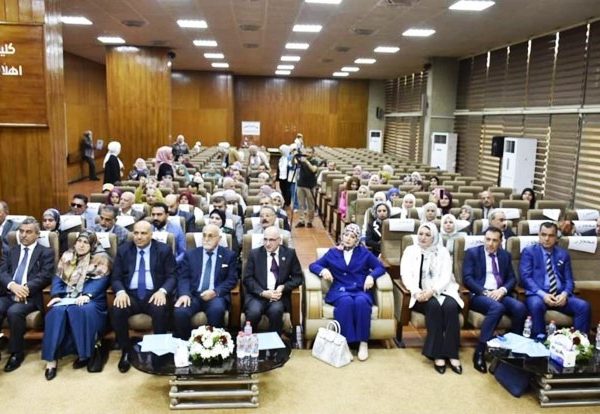Under the supervision of the Dean of the College of Pharmacy, Associate Professor Dr. Sarmed H. Kathum Alkhateeb, Lecturer Dr. Zena Munthir Ahmed, a faculty member at the Pharmacology and Toxicology Department and Ambassador for Childhood at the Child Welfare Authority, participated in the international conference titled “Motherhood, Childhood, and the Sustainability of Human Capital.” This conference was organized by the College of Education for Women in collaboration with the United Nations Children’s Fund (UNICEF) and the Children’s Culture House. It was held under the patronage of the Minister of Higher Education and Scientific Research, Dr. Naeem Alabodi, and under the direct supervision of the President of the University of Baghdad, Dr. Bahaa Ibrahim Insaf, by presenting a study entitled “Childhood and Humanitarian Security from Violence Against Children.” The study addressed the problem of violence against children in Iraq, which poses a threat to security and safety. These incidents are important indicators for assessing the conditions of childhood, which are heading towards deterioration due to the increase in domestic violence on the one hand and the political tensions, wars, terrorism, and economic conditions that Iraq has experienced on the other. Children are the first and biggest victims of societal and governmental neglect. Violence is considered one of the oldest social phenomena known to humanity, with various forms and patterns. One of the most dangerous forms of violence is violence against children in Iraq, as they are the most important demographic in all societies. Violence against children has seen a significant increase due to changes in social, economic, and political conditions, especially in Iraqi society. Despite the efforts of religious doctrines, world governments, and international organizations, including UNICEF, the World Health Organization, and the Iraqi government, to deter and punish such criminal behaviors, violence against children continues to spread. The study recommended the necessity of enacting laws to protect children and implementing penalties against those who assault children. Additionally, it emphasized the importance of promoting modern educational systems and methods to regulate interaction with children in both society and school. Strengthening the role of media in combating violence against children through educational programs was also highlighted, along with the need to increase religious, moral, and educational awareness in society. At the end of the conference, the lecturer was honored with an appreciation certificate for her scholarly contribution to the conference proceedings.





